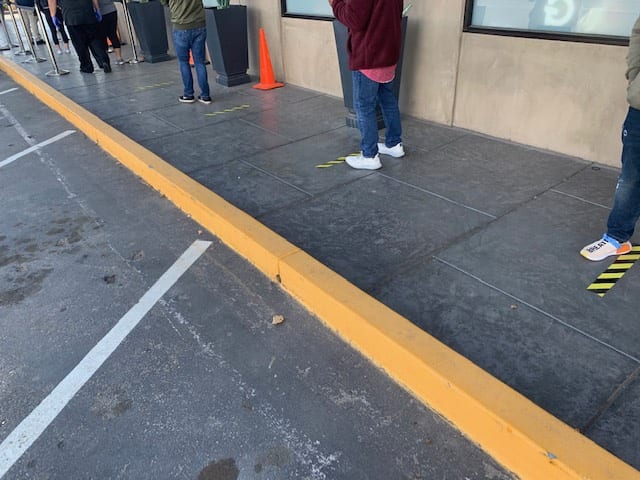Santa Clara County’s cannabis dispensaries will no longer be allowed to sell recreational marijuana at their shops under a new stay at home order issued by top health officials this week.
It’s a reversal from a decision a few weeks ago that allowed the shops to stay open for both recreational and medicinal customers — deeming both an “essential service.” Now, medical marijuana can be dispensed inside the stores or curbside. But recreational users must use a delivery service to receive their cannabis while they shelter in place.
The change drew sharp criticism from the industry even before dispensaries were formally notified that they would face the harsh new restrictions.
“The county is anti-cannabis and they are imposing their moral will on the only city in the county that allows it — but they’re disguising it as a public health concern,” said Sean Kali-rai, founder of the Silicon Valley Cannabis Alliance.
Santa Clara County District Attorney Jeff Rosen gave new guidance late Tuesday to the San Jose Police Department on cannabis dispensaries — which have been operating in the city under strictly enforced social distancing rules during the public health order for Bay Area residents to shelter in place to stop the spread of the coronavirus.
The SJPD, based on legal guidance from the DA — who is charged with enforcing the public health officer’s order — notified the 16 licensed cannabis dispensaries in San Jose of the major change on Wednesday. Rosen could not immediately be reached for comment, but the changes were confirmed by San Jose officials.
Under the revised order, dispensaries will not be allowed to serve so-called “adult-use” or “recreational” customers inside their stores — only “medical customers with a doctor’s recommendation can pick up weed at the shop.


But industry insiders say the distinction between medical and recreational consumers disappeared in 2018 when Prop. 64 made adult use legal across California — saying the change in the public health order will have “devastating consequences” for dispensaries and patients who rely on them by essentially forcing pot shops to shut down to most of their customers.
“The county is playing politics with cannabis and using the public health order as cover to do it,” Kali-rai said. “There’s no logic behind this at all, it is going to endanger public health, not protect it.”
Kali-rai, a lobbyist who represents several San Jose dispensaries, told San José Spotlight that only 3 to 5 percent of cannabis consumers in the South Bay have a doctor’s recommendation.
As recently as Monday, Rosen advised local law enforcement that “…recreational purchasers should be treated the same as medical users for purposes of method of purchase. Accordingly, recreational users should be able to avail themselves of the same mechanisms for purchase as medical users.”
SJPD Cannabis Division Manager Wendy Sollazzi said San Jose dispensaries had been operating under that assumption since the shelter in place order took effect on March 17.
But by Tuesday evening, Rosen reversed that position based on the revised stay at home order from Santa Clara County Public Health Officer Sara Cody, which enacted additional restrictions on “essential businesses.” The restrictions Rosen is calling for are consistent with an update county public health officials made to their department’s FAQs.
“Medical cannabis is still considered essential,” Sollazzi said. “And there are still avenues for dispensaries to continue making sales for both medical and recreational cannabis.”
Nevertheless, the city’s cannabis czar said she’s worried about the unintended consequences of the revised public health order.
“San Jose’s concern is that people will continue to consume cannabis and if we close the dispensaries, in effect, they will turn to the black market — where they sell untested products and don’t age verify,” she said.


For Santa Clara County residents who rely on accessibility to cannabis, keeping pot shops open was essential.
Katie, who declined to provide a last name for privacy reasons, regularly uses cannabis to treat the pain and inflammation her severe rheumatoid arthritis causes, as well as mitigate stress, which can trigger flare ups.
“I actually had a ton of anxiety when the stay at home order was first announced,” the 35-year-old graduate student said. “I think most of us first thought there’s no way dispensaries are going to be deemed essential – politicians don’t make prudent decisions.”
She’s relieved that access hasn’t yet been discontinued. But now there are questions about whether closing the recreational side of the cannabis businesses in Santa Clara County could shutter their entire operations.
Being more at risk for negative consequences of COVID-19, she sees how some changes might be necessary to keep residents healthy. But if businesses shut down altogether, that’s a different story. Katie said she’s concerned about consumers who are unhoused and don’t have a fixed address to receive cannabis.
She also doesn’t want to be forced to rely on prescriptions.
“The simple fact is the more access I have to high-quality cannabis, the less opiates I have to take to control pain,” she said. “Now that I’m back in California, I barely take the Vicodin at all.”
The order for cannabis businesses to move all recreational sales to delivery only is especially hard to swallow in San Jose. The city led the nation four years ago in passing landmark policies to regulate the medical — and then recreational — cannabis market, requiring pot shop owners to register, wear badges, track their crops from seed to sale and pay hefty fees and taxes.
“(If cannabis businesses) close, we would be going to our pain doctors and turning to the pharmacy more often,” Katie said. “But our pain doctors and pharmacists are not making house calls, whereas the dispensaries are. We really appreciate them so much.”
Contact Adam F. Hutton at [email protected] or follow @adamfhutton on Twitter. Contact Katie Lauer at [email protected] or follow @_katielauer on Twitter.




Leave a Reply
You must be logged in to post a comment.